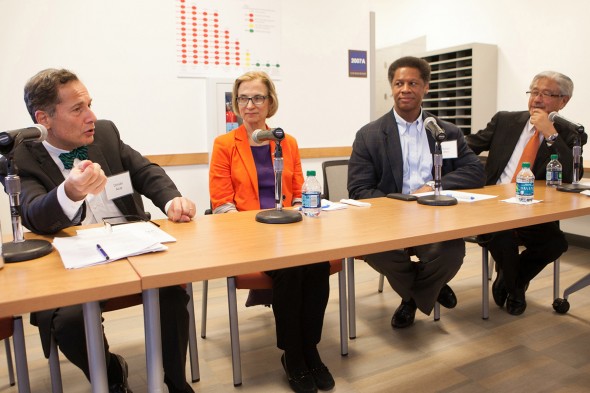National medical leader makes UIC stop on ‘listening tour’

Institute of Medicine president Victor Dzau, right, on a “Listening Tour,” with College of Medicine dean Dimitri Azar, left, Medicine’s Patricia Finn and UI Health’s Robert Winn (center). Photo: Diane M. Smutny
Victor Dzau, president of the Institute of Medicine, was invited to UIC to speak — then he asked for the opportunity to listen.
Dzau gave the commencement address at ceremonies for the College of Medicine May 8, where he also received the college Medal of Honor.
Then Dzau visited Mile Square Health Center for one of the last stops on his ongoing “Listening Tour.”
Since he became president of the Institute of Medicine in July 2014, Dzau has visited eight cities to hear from health care leaders, providers and researchers, gathering information for the institute’s strategic agenda.
The Institute of Medicine is an independent, nonprofit organization that answers questions about health and health care, providing unbiased and authoritative advice to decision makers and the public. Its reports on topics ranging from end-of-life care to medical errors have led to policy changes to help save lives and improve health.
“It’s important to meet with people and find out their concerns about health and the delivery of health care,” said Dzau, whose visit to Mile Square focused on community health care. “You can’t serve people without knowing what’s going on in their communities.”
“Dr. Dzau could not have selected a better venue to discuss the opportunities and challenges unique to providing community-based health care,” said Paula Allen-Meares, chancellor emerita and John Corbally presidential professor and a member of the Institute of Medicine.
The visit was hosted by Allen-Meares, College Medicine dean Dimitri Azar, UI Health associate vice president Robert Winn and department of medicine head Patricia Finn. Rep. Danny Davis and health care providers from other hospitals also attended.
Several themes came up during the discussion, including the need to address the social and behavioral aspects of health; how to communicate the Institute of Medicine’s findings to the community; and using community-level health data in developing targeted prevention and intervention programs.
“It’s the best of times and the worst of times,” Dzau said.
“Advances in science and technology to detect and treat disease has never been better. We can sequence the human genome for a low cost, develop new drugs to treat cancer, and use stem cells for regenerative therapy, but in the midst of all this excitement we have serious health inequity.”
The goal, he said, is a future “where science and technology is used to address health inequity and get us where we need to be in terms of better health for all.”
